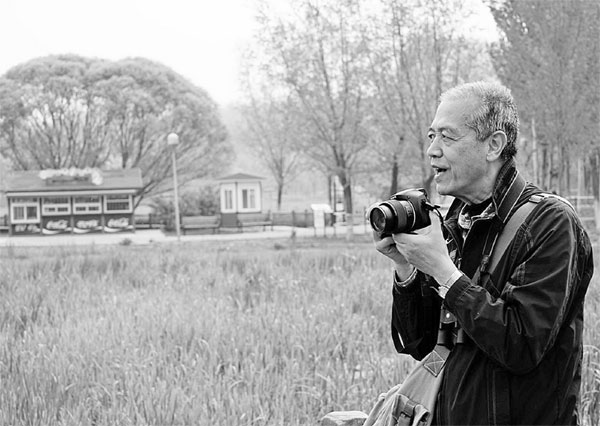A Chinese birdman in beijing
Updated: 2015-05-18 14:24
By Yuan Quan(China Daily USA)
|
|||||||||
|
Lei Hong, a 59yearold Beijing native who has been a bird watcher for 20 years. Provided To China Daily |
Numbers of migrating birds in the capital are falling
Fewer owls can now be seen in the Temple of Heaven, says LeiHong, a 59-year-old Beijing native who has been a birdwatcher for 20 years.
He found only two or three owls in the imperial garden last winter, compared to about 30 a decade ago, which suggests that the owls' food chain might have been broken.
The park authorities have no official statistics, but fellow ornithologists agree with Lei.
Urban expansion, lack of food and a deteriorating environment are all possible factors in the dwindling numbers of migratory birds visiting Beijing from November to April, says Zhao Xinru, assistant professor of Zoology at Beijing Normal University.
"The Temple of Heaven should be a good habitat for birds as it has many tall cypresses with thick branches, where owls like to perch," he says.
But today, "the woody garden has become a lonely island in a concrete forest".
Also, the trees are regularly trimmed so that falling branches don't hit park visitors. The lack of branches makes it difficult for owls to hide and sleep.
A campaign against rats aimed at protecting ancient buildings has also destroyed the owl's staple food, says Zhao, who is also a member of China Ornithological Society.
The creatures spit out what they cannot digest that helps people trace them. But Lei found more bird feathers than rat bones in the owls' saliva.
Zhao notes that the breeding grounds may also have problems. The owls fly from the north to spend winter in Beijing. If the local environment is deteriorating or changing, there will be fewer breeding populations and fewer in the winter ground.
"We don't have any data to support that though," he adds," because the investigation will be long and laborious, and it requires sustained work by researchers.
"Scientific studies need the contribution of both birdwatchers and civil environment organizations."
Lei says the owl is "a divine bird", not only because it has inspired engineers to imitate its out standing night vision and stealth flying, but also because of its special appearance.
"It is hard to recognize as the feathers on back of its head are very like its face," he says.
In fact, the owl was regarded as the Divine Bird as far back as the Qing Dynasty (1644-1911). In the Forbidden City, the court even set up a "divine pole", on the top of which was a pot full of food to feed the owls. This gradually attracted a huge number of them flocking together around the imperial city.
Yet interestingly, Han Chinese see owls as a bad omen. An old proverb goes, "Owls hooting, death coming."
But for Lei , "It is ridiculous. It is superstition."
Obsession
Lei is an avid birdwatcher, traveling all over Beijing and neighboring provinces all year round with his telescope and cameras. He can identify various species by their calls within two or three seconds. He attributes his acute sense of hearing to a decade of keeping caged birds.
Lei recalls: "I raised 70 birds on my balcony in 1989."
He was a regular at Beijing's bird market. "I would buy birds I was unfamiliar with, no matter where they came from." He remembers a couple of birds from Indonesia cost him 60 yuan, which was a big sum in the 1990s.
His largest cage-1.5 meters wide and 0.8 meters high - had a tree stump where birds could perch and rest.
Every summer, Lei would wash the cages with hot water and disinfectant. He read widely about birds and even learned some veterinary skills. If a bird was ill, he would make medicine for it.
Even at home, he liked to watch his birds through binoculars, which helped him find "interesting details," such as when the birds dozed, fought and bred.
"I was very depressed when they died," says Lei, who would bury them in his flowerpots.
Resonance
In 1996, he read an article about Friends of Nature, China's first environmental NGO. He wrote to its founder, and became a member the next year.
The way the members cared for birds was a revelation. "They wanted people to observe birds in the wild. Cages were a selfish hobby that harmed birds," says Lei.
He said goodbye to his birds and set them free. "I released the northern birds at parks, and the southern ones I released during the migration season," Lei recalls tearfully.
But he was reborn. He returned to the natural environment, traveling around Beijing and neighboring provinces to watch birds. He went as far afield as Xinjiang.
He loves to photograph birds, regardless of the weather, mosquitoes or physical discomfort. He once snapped a yellow bittern bird just before it hit the water to catch a fish in a pond.
The picture won him acclaim on bird watching websites.
Fans say Lei's pictures are "full of humanity". He calls a walking magpie "a smart gentleman"; he describes a sparrow hawk in the water as "taking a cold bath"; and in his eyes, a washbowl-sized nest looks like a bird "mansion".
"Their world is similar to ours," he says, "with joy and pain, poverty and wealth."
In 2013, Lei quit his job at a travel agency and had more time to watch birds. He volunteered to do bird surveys, lectured in schools, and joined a growing group that included foreign birdwatchers.
Birdwatching, however, was little known in China until the 1990s.
In 1958, shortly after Lei's birth, China's central government waged a nationwide campaign to eradicate "four pests": rats, sparrows, flies and mosquitoes.
People believed sparrows stole grain, and this was supported by biologists.
About 450,000 sparrows were killed in Beijing in three days that year, according to a report in the People's Daily.
But cockroaches flourished with-out the sparrows in early 1960.
Bird watching as a hobby grew in the 1990s in Beijing and other big cities. Zhao Xinru notes that the mainland has about 40 specialized birdwatching organizations.
Terry Townshend, a British man who works for an environmental organization, has been a birdwatcher in Beijing for four years.
He was amazed to record 460 species in the capital. "It's as an ideal service station" on bird migration routes, he says.
The number of bird watchers in China is still relatively small, but he believes it will grow as Chinese people have more leisure and wealth.
After the hardships of the "cultural revolution" (1966-76), Lei devoted most of his time to making money. But years of bird watching have made him an admirer of their freedom and casual lifestyle.
"It allows me to focus without distractions," says Lei.
However, not all bird watchers have found inner peace.
Lei once caught a photographer throwing stones to wake up owls in the daytime and others who lure birds close with food for the sake of a good picture.
"They just like the picture, not the birds," he says. "How can you impose your thoughts on another species and disturb its way of life?
"Such behavior violates natural law and will eventually affect our own existence."
- Chinese premier's visit to LatAm to enhance capacity cooperation
- Palace Museum to limit daily visitor number by 80,000
- Glacier collapses in China's Xinjiang
- China, Kazakhstan agree on light railway project
- Australian educational institution opens branch in Tianjin
- Modi unveils visa plan to attract Chinese travelers

 China, Ireland sign agricultural deals
China, Ireland sign agricultural deals
 Huge mahjong tiles challenge participants
Huge mahjong tiles challenge participants
 Palace Museum to limit daily visitor number by 80,000
Palace Museum to limit daily visitor number by 80,000
 Vienna hosts Europe's biggest AIDS research charity event
Vienna hosts Europe's biggest AIDS research charity event
 Retro train on display to mark 80th anniversary of Moscow metro
Retro train on display to mark 80th anniversary of Moscow metro
 Ten photos you don't wanna miss - May 16
Ten photos you don't wanna miss - May 16
 Li Keqiang and Modi watch Taichi-Yoga show
Li Keqiang and Modi watch Taichi-Yoga show
 Tyson promises Ip Man fans an explosive fight
Tyson promises Ip Man fans an explosive fight
Most Viewed
Editor's Picks

|

|

|

|

|

|
Today's Top News
Premier eyes growth points on Brazil trip
China, US should not let distractions derail ties: Xi
China, Ireland sign agricultural deals
Chinese premier's visit to LatAm to enhance capacity cooperation
Chinese tennis player Li Na's life story to become a film
Modi unveils visa plan to attract Chinese travelers
United States welcomes AIIB
China's will to safeguard sovereignty "unshakable": foreign minister
US Weekly

|

|








